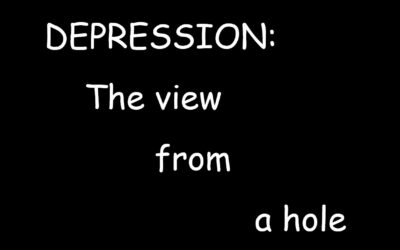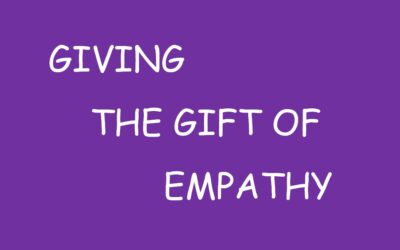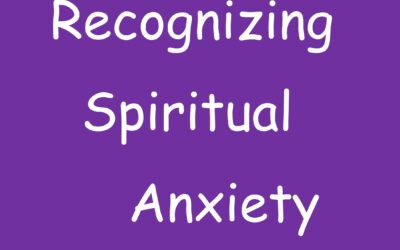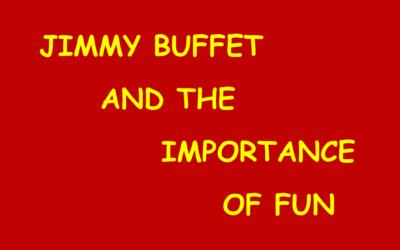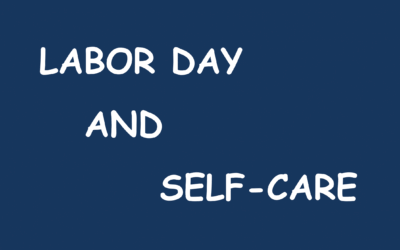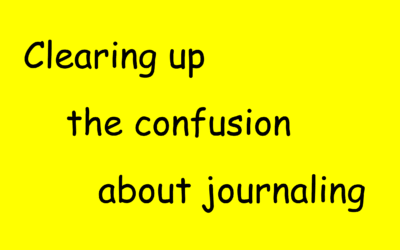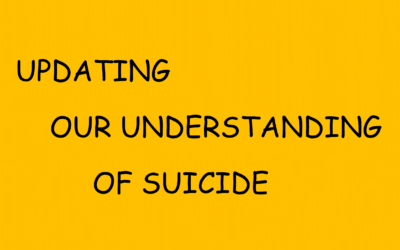Blog & Video Archives
Past Bridge Street Mental Health segment with accompanying text.
The Depressive “Hole”
Everyone knows what it’s like to feel depressed. Indeed, we commonly associate depression with sadness and tears, but there is so much more to this painful condition. DEPRESSION | Pastoral Counseling Syracuse NY (revmichaelheath.com)
When bad things happen to us, it is normal to feel depressed for a while. With time, most folks adjust and things return to normal. Others, however, get stuck and things don’t improve. Clinical depression is a condition that does not just go away.
Depressed moods don’t improve, in part, because depression is not just about how we feel. It’s also about how we perceive.
Depression distorts the way we see ourselves and our outlook on the world. A restricted view blocks our ability to see resources and options and, thus, the situation can look worse than it is.
Although it’s difficult to approximate what a depressed person experiences, the analogy of being in a deep hole comes close. Among other things, being in a hole makes it impossible to see anything but the hole. How depression and anxiety disorders affect our perception of reality (telepsychhealth.com)
Thus, depression prevents us from having a panoramic perspective on our life. Worse, when we are in it, we don’t realize that our perspective is limited. Fortunately, there are ways to become aware.
If things haven’t felt right for more than a couple of weeks and you just can’t shake that feeling, here are some tips to help you know if you’re in a depressive hole and, if needed, how to get out of it:
New Year’s Resolutions
Okay, it’s the start of a new year and many folks are making New Year’s resolutions. Indeed there are lots of folks offering tips on how to succeed. Personally, I have written over 10 articles myself on this topic.
And yet, even with all this help, many are disappointed by their inability to keep their resolutions. Goal Setting Foundations – Arc of Monroe (arcmonroe.org)
The goals, like getting in shape, losing weight, eating healthier, not smoking or drinking less, are good things to strive for. The problem lies in the fact that making and sustaining significant change is complicated.
That said, it is still important to have self-improvement goals and not to give up. Today, I want us to look at the practice of making New Year’s resolutions historically. By doing so, we can gain both perspective on this ancient practice and some insight to help us achieve our goals.
Giving the Gift of Empathy
As Christmas fast approaches, some are still struggling with what gifts to give and how much to spend. While presents and festive wrappings are fun to get, there is one priceless gift that lasts a lifetime and doesn’t cost a cent: empathy.
At a time when tensions are high and conflicts seems to be everywhere, showing understanding and compassion is in great demand. Empathy and Compassion: Building a Stronger Support Community – (b-present.org) Here are some basic tips to help you spread the love of the season and lift the spirits of those you meet with an empathic encounter:
The Story of Mary & Martha
Some people believe that religion and psychology are fundamentally at odds with one another. While there are instances where science contradicts literal interpretations of certain events depicted in the Bible, there are also many stories found in scripture that reveal important psychological truths. https://revmichaelheath.com/reducing-stress-around-the-holidays-a-pastoral-counseling-approach/
Indeed, as a pastoral counselor, I find that using stories from the Bible is a helpful way to communicate psychological concepts. With that in mind, as we approach the holiday season, I want to tell you the story of Mary and Martha (Luke 10: 38-42). This beloved biblical classic has an important lesson for those who struggle with the stress that comes from family and social gatherings at this time of year. https://uihc.org/health-topics/coping-holiday-anxiety-and-stress
Thanksgiving & Stress
Thanksgiving is just around the corner and many families are busy with cooking or travel plans. Although this is a festive time of year, there are those for whom the season is difficult and filled with pain.
Sometimes the contrast between the Norman Rockwell painting and a person’s reality can be depressing. Indeed, having unrealistically high expectations may create unnecessary disappointment. https://newsnetwork.mayoclinic.org/discussion/housecall-10-tips-for-coping-with-holiday-stress/
Besides the hype there are all kinds of reasons that can cause problems. Physical or emotional illness, financial or work stress, marital conflicts, recent loss or loneliness are just a few of some of the challenges that can complicate holiday celebrations.
Likewise, when extended family members or friends gather, long standing feuds and political differences may be a source of strife. So, today I want to offer some tips that can reduce your stress and increase your joy for the holiday season, whatever the problem :
LETTING GO OF SHAME
Shame is one of the most common and destructive of all human emotions. Further, I can say, without reservation or qualification, that shame is a completely useless experience. One of my goals as a therapist is to help eliminate shame whenever I encounter it.
Sadly, many folks misunderstand what shame is. Even dictionaries confuse it with guilt Shame Definition & Meaning – Merriam-Webster. To be clear, guilt is what we feel when we do something that we know is wrong. Guilt refers to feelings of regret over having done something that violates our sense of morality or ethics. Guilt is something that you can do something about to make amends.
I disagree with Webster. Shame does not stem from behavior. I believe that the sense of shame that a person feels stems from an underlying lack of self-worth. It is the comprehensive feeling of self-condemnation for who one is. Shame is an irrational, pervasive, and negative sense of self that falsely seems hopeless and unchangeable.
Another important thing to know is that shame is learned. People have a natural sense of embarrassment but not shame. Shame is the consequence of abuse, be it physical, emotional or verbal.
With these thoughts in mind, I want to focus today on sexual shame: where it comes from, how to get rid of it and how not to shame others.
WAR ,MEDIA and KIDS
The Hamas attacks and Israel’s response have shocked the world. In response, the media has gone with wall-to-wall coverage of the bloody details.
Apart from the devastation itself, the accelerated ways that we receive information from the 24/7 media has created a collateral problem. Fifty years ago people learned about the Viet Nam war on the six o’clock news. Today, however, the omni-present media coverage has greatly intensified our experience of these horrifying events.
As a result, it’s well documented that the incessant flood of bad news has had a negative impact on our emotional health. For example , graphic descriptions of things like beheadings or setting innocent people on fire are simply too much . As a result, folks are reporting that they feel more anxious and depressed than usual.
Given how much kids use their phones, the effects on children can be even worse. Graphic stories and images available on smart phones make those far-away threats feel like they are right next door. Further, the problem is only going to get worse. It is clear that the war is just beginning and the news is not likely to get better in the foreseeable future.
In light of this reality, parents need to be on the lookout for tell-tale signs of trouble. Things like nightmares, out of character crying and other unexplained frightened behaviors could be warning signs to check out.
That said, many parents tell me that they are not sure how to react or what to say to their young ones for whom the war is upsetting. Here are some basic guidelines for helping children deal with disturbing news:
(These tips can not only help you to help your children concerning the war but they also can promote better, over-all communication in the family: How to Talk With Your Child About the Israel-Gaza War – HealthyChildren.org )
SPIRITUAL ANXIETY
People often ask me about the origins of pastoral counseling. While I have written about what pastoral counseling is Pastoral Counseling ? | Pastoral Counseling Syracuse NY (revmichaelheath.com) , I haven’t spent much time explaining its history or its therapeutic foundations.
Historically, clergy have always counseled people with their problems but often their guidance was given clinical training or expertise. However in the early 60s, things changed.
A group of ministers who were also trained psychotherapy got together to form a professional group of pastoral counselors. They called their organization the American Association of Pastoral Counseling.
AAPC’s goal was to elevate the quality of pastoral counseling by requiring more clinical training, supervision and personal therapy for therapists.
Pastoral counselors offered a holistic approach to psychotherapy which included religious experience. This new perspective integrated the psychological and spiritual dimensions of life and its problems.
Not everyone cheered this development. Fundamentalist skeptics condemned professional pastoral counselor for putting psychology ahead of the Bible and of turning to psychotherapy. They viewed science as a threat to traditional religion.
Rather than being a threat to faith, pastoral counseling sought to reduce the tension between religion and science. Pastoral counselors understand science and religion as complementary. Rather than conflicting, they function on two different levels of reality: the physical and the metaphysical (spiritual).
Although religion and science dwell in different realms, they are not disjointed. Earlier in the 20th century, Christian theologians like Rudolf Bultmann believed that the mythic husk of tradition religious language contained a valuable kernel of truth which needed to revealed to fully understood .
Pastoral counseling uses existential psychology to translate/de-mythologize religion’s supernatural/pre-scientific language into expression which are more understandable to the modern world. Psychology provides a way to understand ancient religious wisdom in modern terms.
The existential theologian, Paul Tillich, identified anxiety as the human experience which bridges both worlds of religion and psychology. In his book ,The Courage to Be, he explains how spiritual anxiety underlies psychological anxiety. Paul Tillich – excerpts from “The Courage to Be” – Religious Naturalism
To fully appreciate the significance of Tillich’s insights, it’s important to understand how anxieties differ and how to tell them apart:
JIMMY BUFFETT AND FUN
Like millions of others, I was saddened by the news of Jimmy Buffett’s passing. But I was frustrated by the term used by a number of media outlets to describe the significance of his life and music : escapism. https://www.nytimes.com/2023/09/02/arts/jimmy-Buffett-dead.html?fbclid=IwAR16ox4eBhTkMHnSUGp_88lndNnGy6KjitCVhJAHMAFGCsThb4wm1gWGOYc
Rather than escapism, Buffett understood what many others do not: namely that having fun is important. As a therapist I would say that leisure time is not a luxury ; it is an integral part of balanced life style. Indeed, his life expressed this balance. In addition to being a successful musician and entrepreneur, he always found time for leisure. As he has aid on numerous occasions, “It’s important to have as much fun as possible while we’re here.
Frankly, fun is an interesting word which deseerves more respect. Everyone likes ot have fun but fun itself is seen as trivial and the ursuit of which is not respected. Today I want to share some thoughts to address the under-appreciatiion of fun. I suggest, that despite its trivial associations, having fun it a vital part of a healthy life style.
Given the high level of stress so many experience, Buffett’s perspective on life is a much-needed counterbalance to America’s dominant, hard-work ethic. This stern attitude has permeated the American psyche since our country’s inception. Here are some thoughts to help you bring your work/play division in balance.
Labor Day & Self Care
With Labor Day approaching, we mark the end of summer qnd the start of school and the Fall season. Historically, the Labor Day holiday is a tribute to the contributions that the American worker and organized labor unions have made to our country.
In addition to its social significance, I want us to recognize the contribution Labor Day has made to America’s mental health, i.e. its appreciation of the importance of self-care. APPRECIATING THE DEEPER SIGNIFICANCE OF LABOR DAY: The importance of leisure and self care | Pastoral Counseling Syracuse NY (revmichaelheath.com)
It must not be forgotten that the American labor movement gave us important self-care structures such as the week-end and the 40 hour work-week. These work-limits, which we now take for granted, were mightily opposed by many and were difficult to attain. Implicitly, these work-rules recognized the necessity for workers to have time off from work and to enjoy leisure and rest .
Despite the immense work-place progress which allows for self-care, many still minimize the importance of self-care. So, today I want to take a deep dive into the basics of what real self-care involves.
Specifically, having restful sleep, good nutrition, physical activity, adequate leisure, knoiwing effective stress management, having strong social relationships and getting regular medical/psychological wellness exams are vital for us to be at our best. In doing so, we can learn how these 7 elements work together to promote our mental health and happiness.
Talking or Arguing.
You probably know that communications is a big deal in couples therapy. Although not # 1, numerous surveys have found that, along with money and sex, poor communications is one of the most common reasons that couples seek counseling.
Indeed, many partners report that talking to one another is so bad that they have completely given up on even trying to discuss problems. That’s because what starts out as a simple conversation often winds up as an unpleasant argument.
Today I will show you why you need to 1) Stop using You Statements, 2) Start using You-Statments and 3) Begin using a Marital Journal will help you to dramatically transform your intimate communcateions.
SEX AS A HOBBY ?
In trying to keep up with “what’s happening now” in the field of sexuality, I came across the phrase “sex-as-a-hobby”. Recently, this way of looking at sex has become popular, especially among those who identify as asexual. They find the perspective useful because it understands sex as something that one does and not as a defining characteristic of who one is. Sex As A Hobby: A Transhumanist’s Perspective – Philosophy, Politics, and Science – Asexual Visibility and Education Network (asexuality.org)
Others, such as sex coach Ruth Ramsay, employ the sex-as-a-hobby approach to de-mystify the highly emotional topic of sexuality. She finds the concept useful to help couples learn to discuss and deal with sex-related problems more rationally. Revamp your sex life in 6 minutes | Ruth Ramsay | TEDxDaltVila – YouTube
At first I laughed at the notion of thinking of sex was like a hobby but, the more I thought about it, the more I realized that it made sense., Although a hobby might not be the best metaphor, we do need to redefine and change how we think about sex. Here’s why:
Common Porn Myths
Recently, I have noticed a significant up-tick in the numbers of clients contacting me who erroneously feared that they had a pornography addiction. After a careful examination, it was clear that, while they had been suffering from misinformation, they did not have an addiction.
It needs to be understood from the outset that even though “pornography addiction” is a popularly used term, I do not find it a help way to conceptualize the problem nor is it listed in the DSM5 as a disorder. Religious or moralistic discussions often denounce problematic masturbation and porn viewing as immoral or a lack of self-control without understanding of its psychological origins.
Although pornography is part of the problem with which these men struggle , it rarely was not the root. Prior childhood trama, religiously induced guilt and shame about sex and marital dischord are common underlying culprits.
The last time I wrote on this subject was four years agao. A Reasonable Approach for Discussing Masturbation and Pornography: Part 1 | Pastoral Counseling Syracuse NY (revmichaelheath.com) . Given that misunderstanding has not declinced, I wish to debunk some of the most common myths about pornography.
A recent article in Slate on-line provides an excellent segue for this discussion. What NoFap does to your brain: Why so many people who abstain from masturbation end up suicidal. (slate.com) Although it’s focus is on a particular anti-masturbation effort, NoFap, it provides a goosd summary of the major false notions about pornography.
JOURNALING CONFUSION
For many years, journaling has been a helpful tool for those dealing with stress and emotional issues. Even our military recognized the benefits of journaling and has incorporated the practice to help deployed soldiers.
It is important to appreciate, however, that not all personal writing is the same . In addition to individual journaling, marital journaling is a distinct practice and can be an important way for couples to improve their intimate communication.
That said, there are significant differences between individual journaling and marital journaling which need to be understood.
Here are some thoughts to help couples who are confused:
Suicide: An Update
A recent article in the Syracuse Post-Standard cited the alarming rise in teen-age suicides and homicides beginning with COVID-19 which has continued to the present. https://www.syracuse.com/us-news/2023/06/suicides-and-homicides-among-young-americans-jumped-early-in-pandemic-study-says.html
What is even more disturbing is the fact that suicide rates were already increasing before the pandemic. https://wjla.com/news/nation-world/more-than-a-mental-health-concern-nationwide-increase-in-suicides-prompts-newquestions?fbclid=IwAR1qWZbKn3G1ex_bv8XryK22NuohENbDSC2v87crC_YCcUBpyLoMM-BWEgI
Given other reports on our current mental health crisis, it’s probably a good time to update what we know about suicide.
HOW TO TALK ABOUT SUICIDE
To begin, an important change which has taken place in suicide discussions is the words that we use to talk about it. Instead of saying that someone committed suicide, a better way to express it is to say that the person died by suicide .
While this might seem like a trivial distinction, the change emphasizes the fact that, in most cases, suicide is not a free choice or conscious act. In addition, the traditional expression of committing suicide denotes needless stigma and shame.
2017
- May 31, 2017
Understanding the Parallels between Biblical and Psychological Wisdom - May 14, 2017
Aprreciating the Emotinal Complexity of Mother’s Day - May 02, 2017
Redefining Mental Health: The Struggle to be Reasonable - April 16, 2017
Easter and the Therapeutic Process: The Rest of the Story - April 02, 2017
Judgers and Perceivers - March 19, 2017
Communication Tip # 6 : Understanding the Differences between Thinkers and Feelers - March 04, 2017
Communication tip #5 : Understanding iNtuitive and Sensate Personality Differences - February 21, 2017
Communication Tip # 4: Understanding the differences between Extroverts and Introverts - February 03, 2017
Aristophanes and the Myth of Androgyne: The Soulful Meanings of Love - January 15, 2017
The Myth of “Holding on” to the Past : Neuro-science and the Grieving Process - January 02, 2017
Being Reasonable about New Year’s Resolutions:
2016
- December 17, 2016
New Research offers Hope for Resistant Depression - December 04, 2016
Bursting Some Common Myths About Pastoral Counseling - November 23, 2016
Thanksgiving: A Time for Regaining Perspective and ,for some, Conflict - November 11, 2016
Dealing With Political Grief - November 02, 2016
Explaining the Facebook Study: Turns out Cyber Friends Are Important Too - October 19, 2016
Beyond Romantic Myths: 9 Tips for Getting real about what it takes to have a great marriage - October 03, 2016
Why Mental Health Check-Ups Are a Good Idea - September 15, 2016
Appreciating the Health Benefits of Good Friends - August 31, 2016
When it comes to sex, men are Windows and women are DOS - August 14, 2016
Good News for People Who Worry about Memory Loss - August 05, 2016
The Psychology of Blaming: Learning to See the Fear Behind the Anger - July 07, 2016
Psychological Manipulation: What it is and How to deal with it. - June 21, 2016
Coping with the Absurd and the Horrifying Stories in the News - June 05, 2016
Do you have to be “crazy” to see a therapist ? - May 18, 2016
Sex in Marriage : Are You having Enough ? - May 07, 2016
Updating the Image of Psychotherapist: A Life-Tour Guide - April 29, 2016
Updating the Image of Psychotherapist: From Orthodontist to Helicopter Pilot When people think abo - April 12, 2016
Spring Cleaning for your Marriage - March 28, 2016
Some thoughts about the importance of Hope - March 16, 2016
I-Statements 101: The Keys to Expressing Anger Constructively - March 02, 2016
Understanding Leisure as an Essential Part of Self-Care - February 12, 2016
Romantic Myth # 3: Love is a Special Feeling - February 09, 2016
Romantic Myth #2 : Love Never Ends - February 06, 2016
Bursting Popular Myths about Love - January 25, 2016
How to Make a Worry List: The Importance of Emotional Triage - January 12, 2016
Want More Intimacy In Your Relationship? Try Sharing Your Dreams - January 02, 2016
The Secret to Keeping New Year’s Resolutions
2015
-
- December 21, 2015
Light and the Meaning of the Holidays - December 07, 2015
Dealing with Increased Terror-Related Anxiety - November 20, 2015
Dealing with the stress of Holiday Gatherings - November 10, 2015
Are You An IMpatient Person ? - October 27, 2015
How Exchanging Marital Report Cards Can Improve Your Relationship - October 07, 2015
October is Domestic Violence Awareness Month - September 21, 2015
Understanding the new “Female” Viagra - September 12, 2015
Talking about end of life issues and facing our fears of dying - August 24, 2015
Bursting the Forgiveness Myth - August 13, 2015
Understainding our False Guilt about Sex - August 02, 2015
Do you know your “Organ of Distress”: Recognizing when an emotional fire is about to break out. - July 20, 2015
How to Build Trust After an Affair . - July 05, 2015
The “Emotinal Cigarette” – A breathing exercise to help you relax. - May 18, 2016
Sex in Marriage : Are You having Enough ? - June 24, 2015
Good News for Work Outs - June 15, 2015
Sneaky Depression Triggers - June 03, 2015
Human Sexuality Is More Complicated Than You Think. - May 28, 2015
Mental Health Myth # 4: Talking to friends is the same thing as going to therapy. - May 28, 2015
Myth # 3: Psychological disorders are very rare - May 06, 2015
The Myth of Mental Illness: 2.0 - May 03, 2015
Did you know that May in Mental Health Awareness Month ? - April 25, 2015
Bruce Jenner Interview Outshines Olympic Gold - April 10, 2015
White House Supports Ban on “Conversion Therapy” for Gay and Transgender Youth - April 03, 2015
Sexism in FDA: Continues a Double Standard, Hurts Women - March 16, 2015
Taking Your Emotinal Pulse - March 05, 2015
Your Emotional Docimeter
- December 21, 2015
Rekindling Passion: Part Two – The Secret to Re-igniting the Fames of Desire
-
- January 30, 2015
Rekindling Passion: Part One – The Truth about Aphrodisiacs - January 14, 2015
Emotional Triage and the Worry List - January 06, 2015
A Check-List Before Making Your New Year’s Resolutions
- January 30, 2015
2014
- December 10, 2014
Reducing Stress Around the Holidays - November 23, 2014
Feeling Grattitude When Times Are Hard - November 07, 2014
Reducing Stress for Seniors : Tips for Dealing with Everyday Worries and Finding More Joy in LIfe - October 27, 2014
Five Things You Didn’t Know About Halloween - October 14, 2014
Having Good Sex is a Sign of a Healthy Marriage - September 30, 2014
New “Consent” App Asks Partners Important Questions to Think About Before Having Sex - September 09, 2014
Lame Excuses – Why we make them. How to stop. - August 13, 2014
Robin Williams’ Severe Depression: Keeping Things in Perspective - July 16, 2014
The Quiet Crisis: Adult Children Caring for Aging Parents - June 18, 2014
Clearing up the confusion about Transgendered People and Gender Non-Conformity: Getting the medical - May 21, 2014
Getting Rid of Grudges: Just let it go – or maybe not. - April 16, 2014
Finding Romance among the Diapers - March 26, 2014
Bursting the “Hard Work” Myth”: The Importance of Leisure - February 12, 2014
Wedding Insurance and Pre-Marital Counseling :Bursting the Obligation Myth. - January 15, 2014
Submissiveness and Leadershipin the Modern Marriage
2013
- December 23, 2013
Reducing Stress Around the Holidays – A Pastoral Counseling Approach - December 18, 2013
Balancing Career and Family - November 19, 2013
Dating Younger: How the internet and social media have expanded dating choices for single people - October 30, 2013
Five Things You Didn’t Know About Halloween - October 09, 2013
Are You Bing Bullied in the Workplace ? - September 04, 2013
Are You Addicted to the Internet ? - August 14, 2013
Post-Partum Depression: What every expectant or new mom needs to know. - July 31, 2013
Secrets of Assertiveness 101: - July 08, 2013
Sex Education for Adults: Cheating - June 17, 2013
PTSD Awareness - June 05, 2013
Leaving the Nest – Vaulable Tips for Parents and Young Adults - May 22, 2013
Five Mental Health Myths - May 08, 2013
A Spring Cleaning for Your Marriage: Personal Appearance - April 17, 2013
Dealing with the Boston Marathon Bombings? - March 28, 2013
“Breaking up” with your Hairdresser - March 13, 2013
Is This ( am I ) Normal - February 27, 2013
Romantic Second Chances: When should I give him (her) another chance? - February 13, 2013
Caring and Consideration: The Keys to Lasting Passion - January 17, 2013
Emotional First Aid: Tips for Responding to Everyday Psychological Distress - January 02, 2013
New Year’s Resolutions: Why We Brake Them, How To Keep The,
2012
-
- December 19, 2012
Take Controle of your Holiday Stress - December 03, 2012
Life Smarts and The Intelligence Myths
- December 19, 2012
- October 30, 2012
Here’s the Skinny on Scary: The Facts about Phobias - October 19, 2012
Oh, I Remember it well … or maybe not ! - September 26, 2012
The Importance of Remembering - September 05, 2012
Going Back to School Chaos: Help for Parents - August 17, 2012
Money Conflicts and Marriage: Tips for Keeping the Peace - July 30, 2012
Using Your Imagination to Overcome Procrastination - July 23, 2012
UPreventing Tragic Story Overload in the Wake of the Colorado Massacre - July 09, 2012
Redefining Normal: An Inclusive Way of Understanding Mental Health - June 27, 2012
PTSD National Awareness Day : Myths and Facts - June 20, 2012
Reducing Stress When You Travel - May 30, 2012
How to Cope with an Unreasonable Boss - May 16, 2012
How to Disagree without Being Disagreeable - May 14, 2012
Myths and facts about happiness: What really makes us happy ? - April 25, 2012
Body Language: Our Emotional Traffic Lights - April 04, 2012
The Importance of Work Place Colleagues - March 14, 2012
Stress and Relationships - February 29, 2012
Is It Love or Chemistry ? Tips for knowing when real love comes along. - February 13, 2012
Can Love and Romance Last ? Yes, But It Takes Work ! - January 18, 2012
Why am I so Impatient ? Tips for Dealing with the New Technologies that are Driving us Crazy./a> - January 04, 2012
The Psychology of Successful Weight Loss — Tips for Avoiding the Emotional Pitfalls which Sabotage
2011
- December 23, 2011
Are You Emotionally Out of Shape ? Here’s a Check List to Help You Become Emotinally Fit - December 07, 2011
Don’t be So Defensive – Tips for Dealing with Criticism Gracefully - November 23, 2011
Feeling Gratitude in the Wake of Hard Times - November 08, 2011
The Truth about Secrets and Itimacy in Marriage - October 26, 2011
How to Have A Constructive Argument - October 12, 2011
The Psychological Cigarette – Understanding the Breathing/Relaxation Connection - October 03, 2011
Am I OCD or just really particular ? - September 12, 2011
The 411 about Marriage Counseling – What it Can and Can’t do. - August 09, 2011
Psychology and Smart Phones: The Risks of Overusing your PocketPC - August 01, 2011
The Art of Compromise: Keys to Successful Marital Negotiation - July 20, 2011
Planning your wedding ? Don’t forget your relationship: the Essentials - July 05, 2011
Creating 2nd Chances: Tips for Turning a Bad Situation into a Good One - June 08, 2011
The Seven Year Itch: Why it Happens and How to Prevent i - May 25, 2011
Fair Fighting – Some Ground Rules for Resolving Marital Conflicts - May 11, 2011
Unnecessary Criticism: Why we do it ; How to stop it - April 27, 2011
Money Conflicts in Marriage: It’s not just about the Money - April 13, 2011
Spring Cleaning Your Marriage: Personal Appearance - April 01, 2011
Understanding and Coping with Jealousy in Marriage - March 16, 2011
Therapeutic Self-Talk: What it is, Why it’s Helpful and How it Works . - March 09, 2011
Breaking the Ice After an Argument: Understanding the Psychology of Post Argument Silences - February 23, 2011
Guilt-Tripping and Emotional Manipulation No one likes to be guilt-tripped, yet it happens all - February 14, 2011
The Secret of Keeping Romance Alive: Tips for Busy Couples - January 26, 2011
Sibling Relationships 101:Tips for Updating your Sib Status - January 19, 2011
How Words Can Help Us to Heal The tragedies of the Tucson shooting has created many emotional wounds - January 14, 2011
A Myth About Mourning Although most of the country was moved by the ceremony held for the victims - January 06, 2011
Boosting Your Brain: Sorting out the Facts from the Myths
2010
- December 29, 2010
End of Year Marital Review and Marital Resolutions for the New Year - July 19, 2010
Pouting - June 28, 2010
Are You Just Discouraged or Really Depressed ? How to Tell the Difference - May 25, 2010
Emotional False Alarms - May 06, 2010
The Science of Making Up - April 12, 2010
Spring Cleaning for your Marriage
2009
- December 07, 2009
Marital Make-Overs for the Holidays: Tips for Fallling in Love All over Again - November 02, 2009
Marriage Is Hard - October 05, 2009
Keeping Your Cool - September 10, 2009
Nagging: Why we do It , How to Stop - July 23, 2009
Understanding Affairs - June 30, 2009
Interviewing Successfully - June 01, 2009
Helping our Parents with Difficult Decisions - March 09, 2009
The Good News About Stress - February 19, 2009
Talking to Teens about Sex

